July 23, 2020, is the fourth day of Tsinghua Global Summer School, supported by the Global Alliance of University on Climate (GAUC) and the School of Environment. The academic theme for day four, "Sustainable Development Post Pandemic, " is closely linked to “Transforming our World: the 2030 Agenda for Sustainable Development” adopted by the Head of State and Government at a special UN summit in 2015. Distinguished guests that day shared their thoughts on various topics concerning sustainable living, such as low-carbon energy, climate change, and air pollution control. In addition to keynote lectures, the course also included thematic reports, student-led discussions, expert commentaries, and teacher-student engagement. Students who attended this course gained a deep understanding of how to protect the environment and achieve sustainable development in the current situation.
As the highlight for the day, the 15th “Climate Change Global Lecture" as part of the Tsinghua Global Summer School 2020 was made available to the public, entitled "Climate Governance in a Post Pandemic World”. The U.N. Secretary-General, H.E. Mr. Antonio Guterres, gave the honorary speech for this lecture, which was also the first speech given by the Secretary-General addressing educators and students worldwide since the outbreak of the pandemic. On behalf of the teachers and students of Tsinghua University and those from member schools of the Global Alliance of University on Climate (GAUC), President Qiu Yong gave the welcoming remarks and expressed his gratitude to Mr. Guterres for his time and dedication. Moreover, this lecture also invited Professor Lawrence Tubiana, CEO of the European Climate Foundation (ECF) and Chair of the Board of Governors at the French Development Agency (AFD), along with Minister Xie Zhenhua, Special Advisor for Climate Change Affairs of China and also the President of the Institute of Climate Change and Sustainable Development (ICCSD) of Tsinghua University.
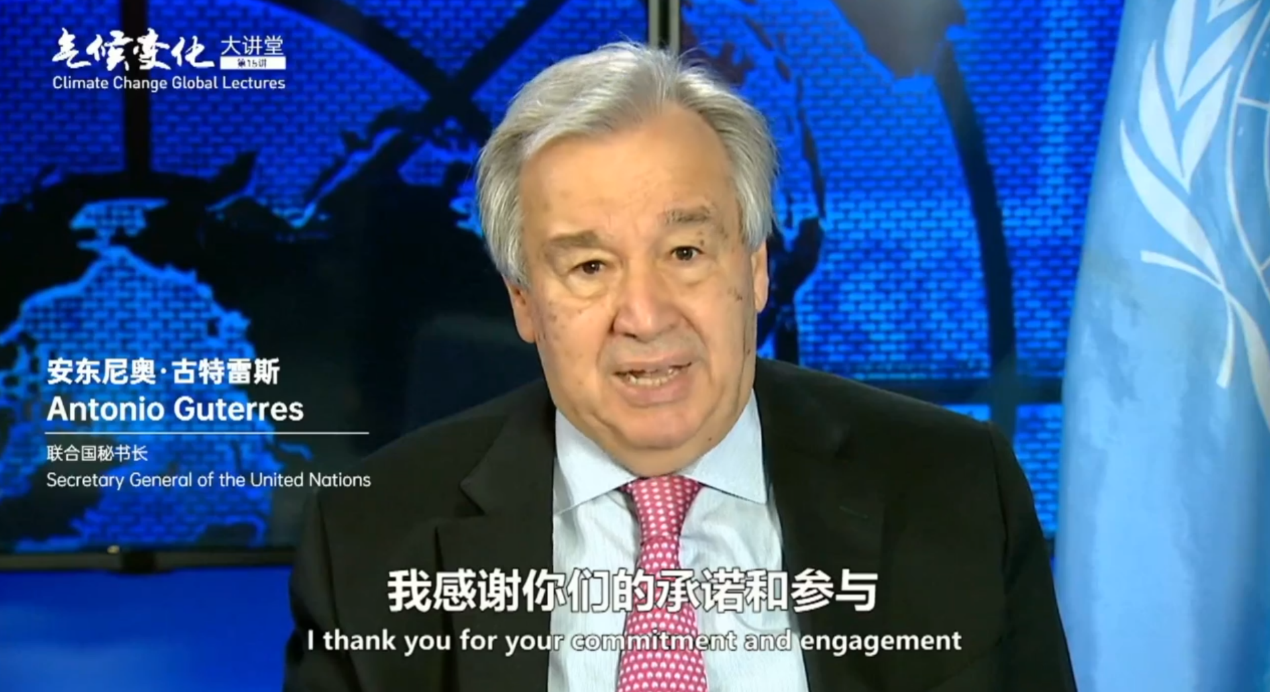
In his speech, Mr. Guterres pointed out that as an unprecedented crisis, the COVID-19 pandemic is a health crisis and a crisis that concerns the economy, society, and overall development of humanity. This has in turn, underscored the world's fragilities, exposing severe and systemic inequalities between countries and communities. "Poorly coordinated policies risk locking in or even worsening already unsustainable inequalities, reversing hard-won development gains and poverty reduction, and a high emissions future. More than ever, we need unity and solidarity for action, " said the Secretary-General. Mr. Guterres also used this opportunity to acknowledge China's achievement in tackling climate change. He stated that in the past five years, China has deployed more solar and wind energy generation capacity than any other country. Towards the end of his speech, Mr. Guterres spoke highly of the role of young people in tackling climate change, encouraging them to innovate and speak up as we work together to achieve a more inclusive and sustainable future.
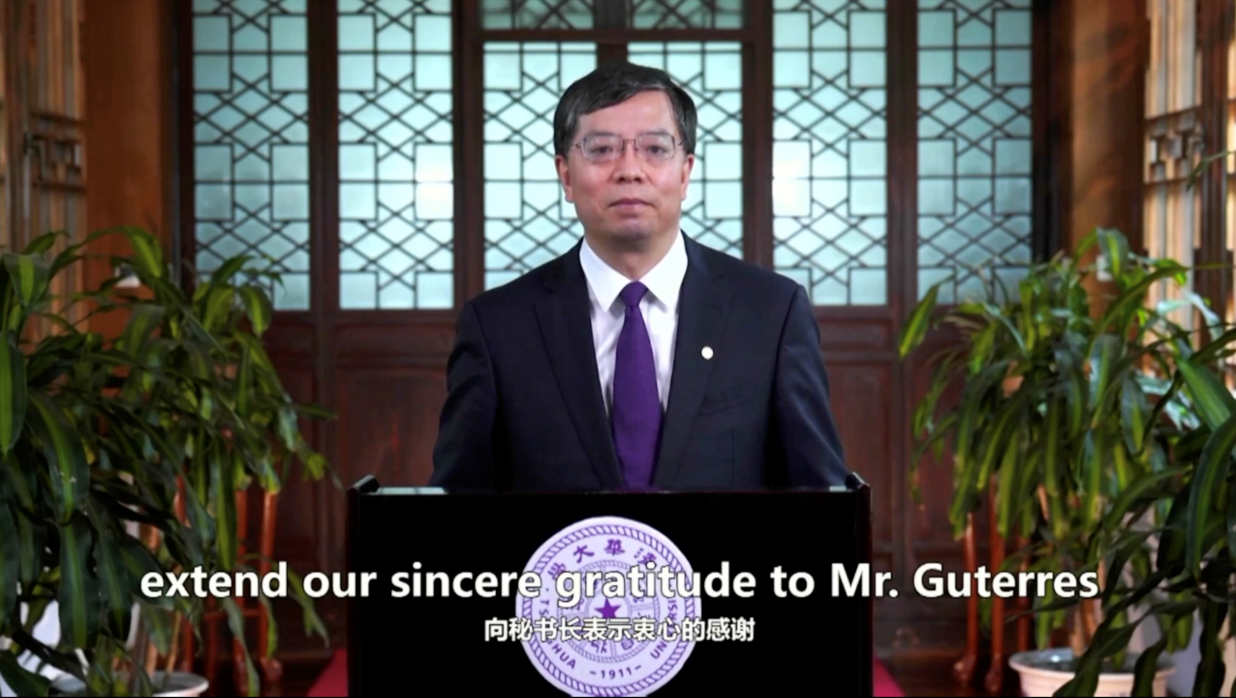
President Qiu Yong expressed his gratitude to Secretary-General Mr. Guterres and introduced a series of actions taken by Tsinghua University to tackle climate change. In May 2019, twelve universities from six continents established the Global Alliance of University on Climate (GAUC) to cooperatively address the mission of combating climate change. Later that year, on November 17-19, a group of 150 postgraduate students from 55 universities across nine countries participated in a forum initiated by the GAUC to discuss ways to deal with climate change and to promote the building of an ecological civilization. President Qiu also emphasized that youth is the most proactive and vigorous power in shaping our society's future. There is no doubt that they should be more courageous while shouldering their historical responsibilities and draw strength from the inclusiveness and dignity of our society.
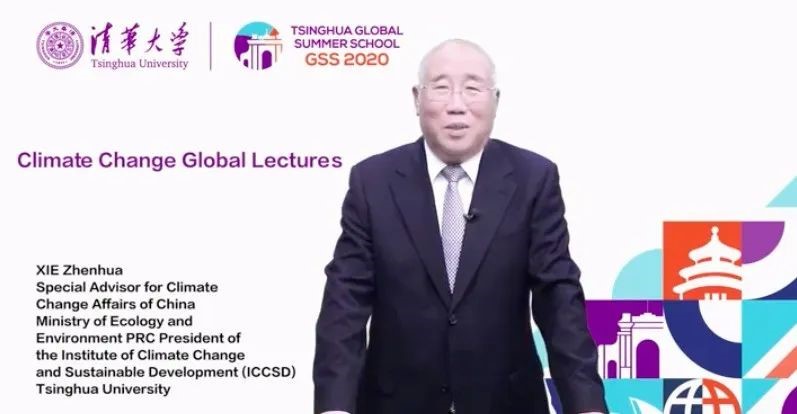
In Minister Xie Zhenhua's address, he stressed the determination of implementing the Paris Agreement despite the disruption brought by the pandemic. He stated that the global trend of green and low-carbon development is irreversible and that it should be highly prioritised in each countries' socio-economic development plan. Minister Xie believed that the initiative of Mr. Guterres to “Recover Better Together” has set forth a clear direction for countries to jointly battle against COVID-19 while reshaping the relationship between humans and the environment to tackle the climate crisis. Additionally, Minister Xie highlighted China's constant support for the fight against climate change. The country has made it an important strategic measure to promote quality assured sustainable development as it is part of building the community with a shared future for mankind.
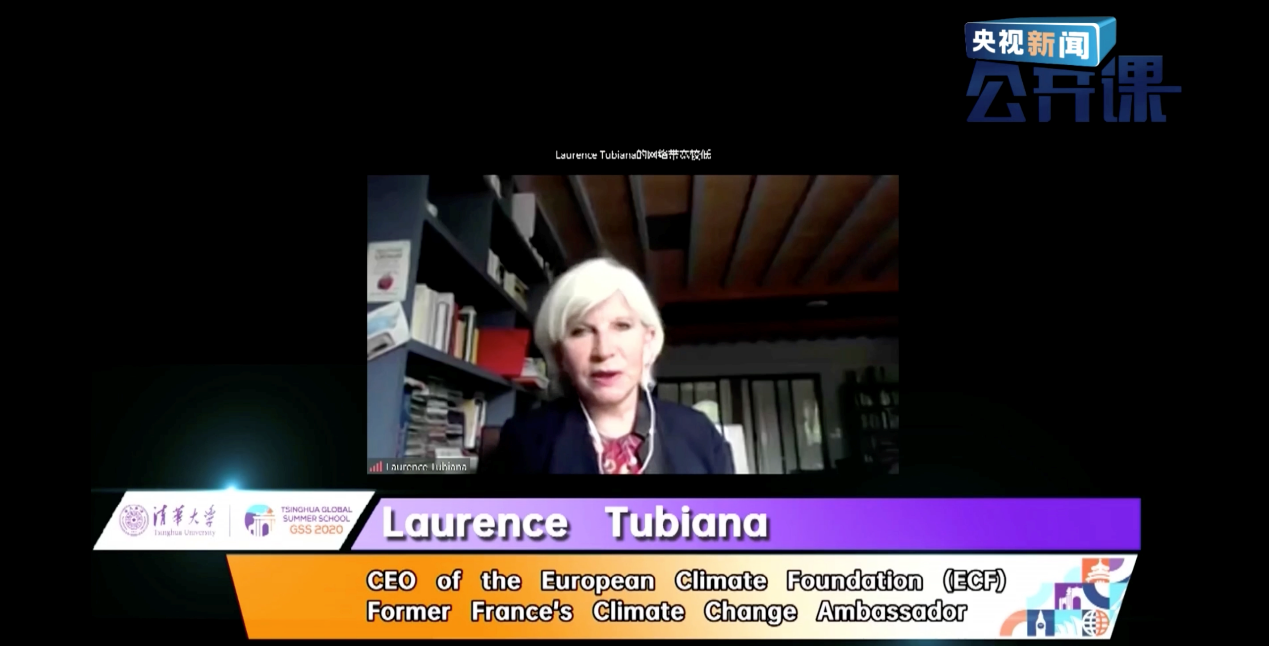
Professor Lawrence Tubiana delivered her speech revolving around the global climate governance trend and China-EU relations. She mentioned that the speed, scale, and content of our post-pandemic recovery plan is crucial to achieving the Paris Agreement and the Sustainable Development Goals. At these moments, the European Union and China, as two leaders of its region and country, should work together to seek pragmatic solutions to the problems we face. Professor Tubiana pointed out: “the EU Heads of States and Governments this week decided on the European financial priorities for the next seven years and as a response to COVID-19. Unanimously, they agreed that 30% of the 1.8 trillion Euro package – in total 550 billion Euros – should be spent to finance climate action." She also mentioned that despite the current health and economic crisis, the EU is still committed to moving in that direction. Before she ended, Professor Tubiana called for international cooperation as she believed that global problems would require global solutions.
The lecture was hosted by Professor Li Zheng, the Executive Dean of the Global Alliance of Universities on Climate and Vice President of the Institute of Climate Change and Sustainable Development of Tsinghua University (ICCSD). Professor He Jiankun, the Deputy Director of the National Committee of Experts on Climate Change and the Head of Academic Committee at ICCSD, also commented on the lecture saying: "Hand-in-hand to achieve green and higher-quality recovery is our common mission and common cause. No matter what challenges lies ahead, as long as we persist in global cooperation and practice low-carbon development, we will soon get closer to the realization of sustainable development goals!"
A pre-lecture workshop entitled“Climate Change: Science, Economics and Ethics” was given by Associate Professor Teng Fei, Deputy Director of the Institute of Energy, Environment and Economy at Tsinghua University. He introduced some basic knowledge on the latest developments on climate change scientific research and the global process of addressing this threat.
The course for Day 4 of Tsinghua GSS took a step-by-step approach, focusing on students' participation and engagement. Through each lecture and discussion, students gradually deepened their understanding of today's theme. As GSS students were required to participate in group discussions to share their thoughts with others, they drew inspiration from the webinar host and developed unique ideas on realizing a low-carbon, green and sustainable society. Through such meaningful engagement, students can resolve the contradiction between economic growth and environmental protection, allowing them to explore more harmonious ways to interact with our planet.
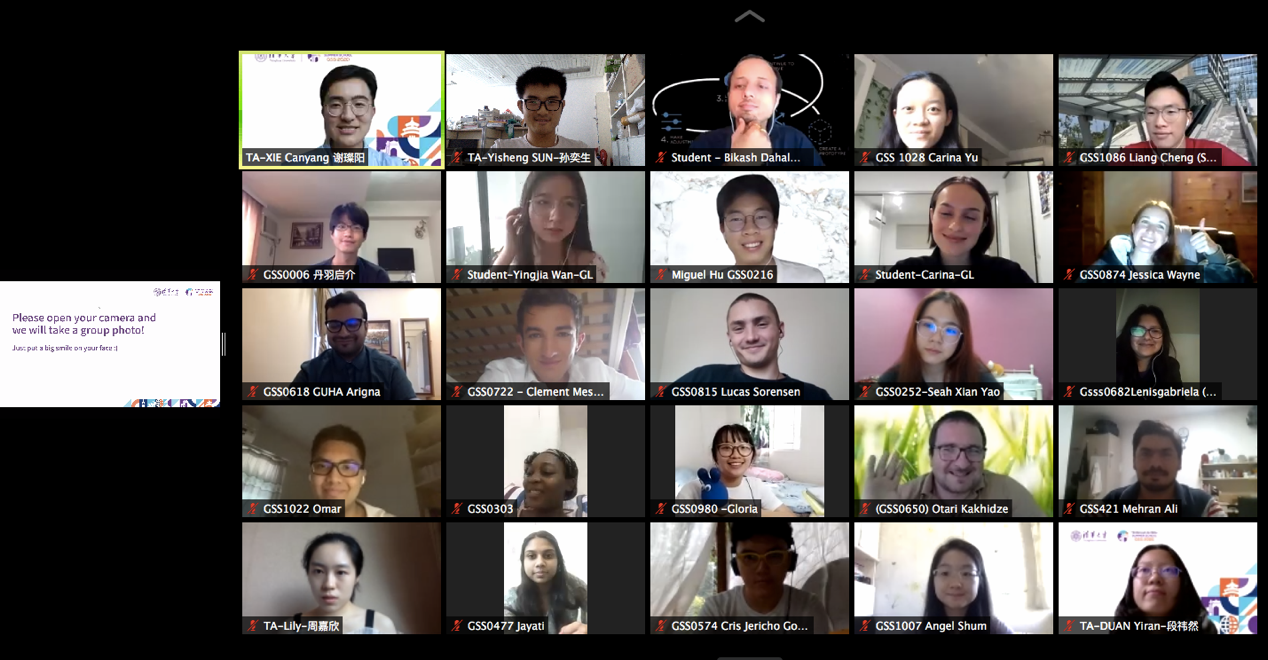
At 9 am and 4 pm, the School of Environment (SOE) organized two brainstorming sessions with the theme of "Building a low-carbon, green, and sustainable society in the post-pandemic world." Organized by students from the Global Environment Program (GEP) of the faculty, the brainstorming sessions had students discuss issues related to the 2030 United Nation's Sustainable Development Goals (SDGs), with a focus on ways to approach the environmental crisis and to incorporate sustainable development into the post-pandemic recovery plan. Many interesting topics were mentioned during the brainstorm, such as public health, the economy, transportation, energy, education, and related topics.
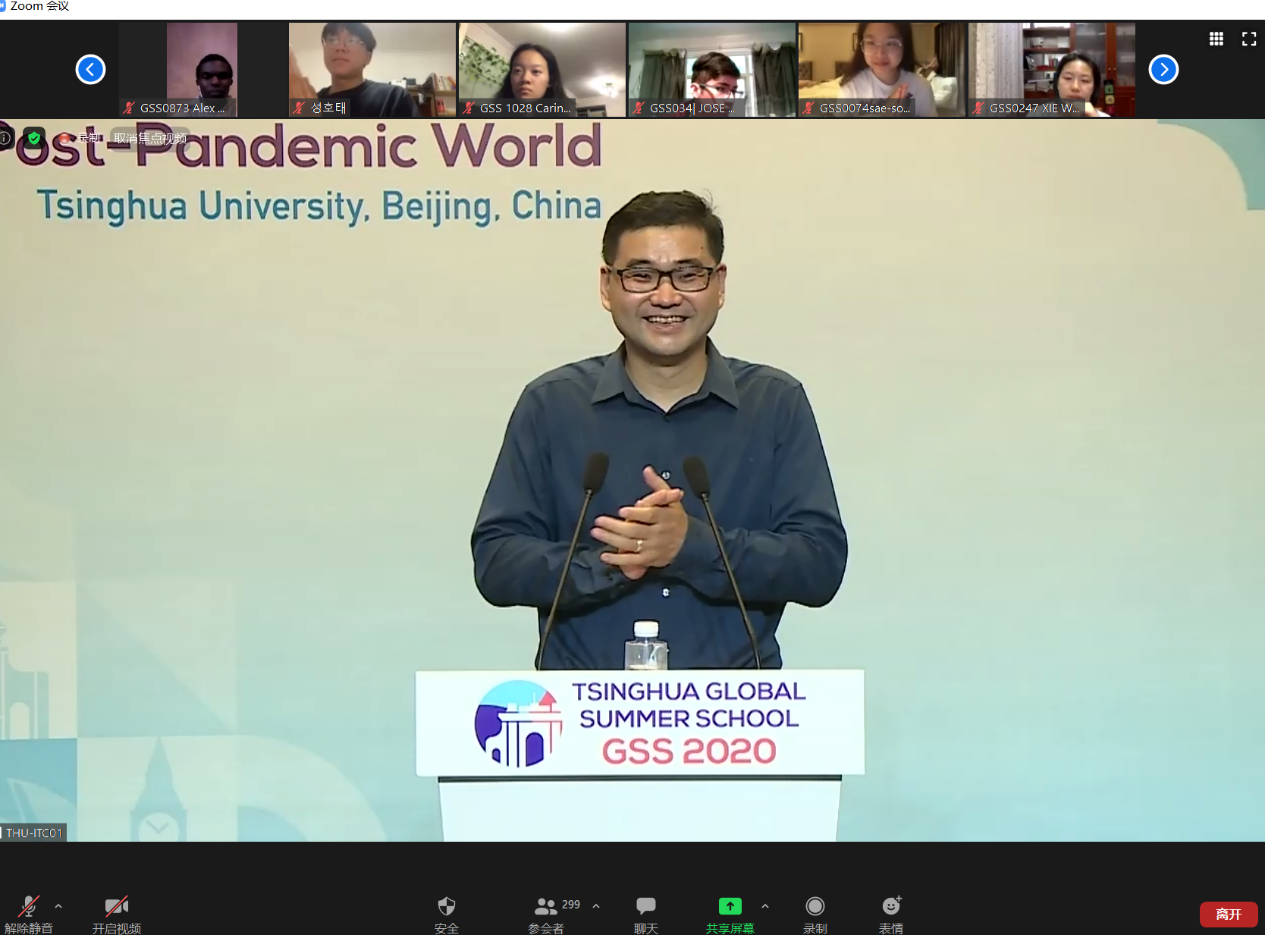
The last lecture of day four was the webinar entitled "Sustainable Development Under and Post-Pandemic", hosted by Professor Xi Lu, Associate Professor from the School of Environment and the Project Director of the Global Environment Program. Distinguished guests include Professor Wu Ye, Vice Dean of the School of Environment, Professor Hou Deyi, Associate Professor and Project Director of the Summer School Program from the School of Environment. In addition, we were also delighted to have Professor Michael B. McElroy, Gilbert Butler Professor of Environmental Studies at Harvard University who currently holds the chairmanship of the Harvard-China Project on Energy, Economy, and Environment. He joined us in the webinar, explaining the origins of climate change, the current challenges we face, and coping strategies in moving forward. Professor McElroy also talked about the impact and opportunities brought by the pandemic on our future energy system. Participants of the webinar actively engaged with the professors with questions concerning the cost of renewable energy, the characteristics of our energy system in various countries, energy conservation, and emission reduction. Finally, Professor Hou summarized the course for day four of Tsinghua GSS, hoping that students worldwide could work in synergy to realize the Sustainable Development Goals.
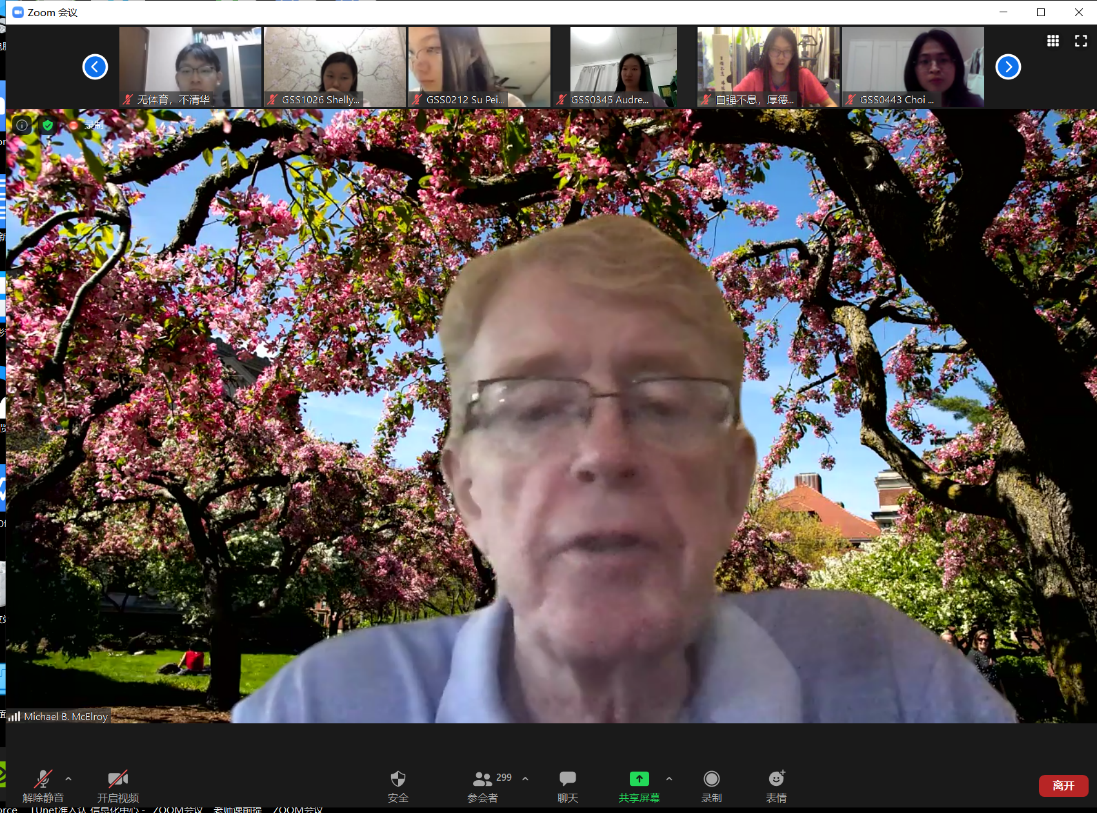
During the discussion, the students actively expressed their opinions based on their professional knowledge and the situation of their country. In the lively discussion and debates, they generally believed that it not only required the participation of governments, enterprises, and the public to achieve sustainable development goals in the post-pandemic era, but also required more active international cooperation.
At the end of the course, Douglas Anderson, an international student from Bishops University in Canada, said that this course provided an informative and enlightening platform that inspired him to look to the future with a more comprehensive perspective. He believed that being able to talk directly to the world was a unique and precious experience, and it made him realize that in this difficult period, everyone should innovate together to overcome the difficulties.
The Tsinghua University online Global Summer School (GSS) 2020, entitled Toward a Post-Pandemic World is a nine-day journey carried out collaboratively by 17 global academic institutions, including ten different colleges and departments of Tsinghua, five overseas institutions, and two international associations for higher education initiated by Tsinghua. GSS will delve into our post-pandemic world in various disciplines - including economics, education, society, artificial intelligence, climate change, and leadership - and engage with students through lectures, group discussions, and cultural experiential events, integrating the academics with innovation and interaction. GSS strives to break through boundaries, technical limitations and identity constraints to address social issues. The summer school aspires to integrate resources and collaboration inside and outside classes, off and on campus, in China and other countries, and online and offline.
Reporter: Matthew Aw
Photos: Qiu Yinghan, Li Ruyi
Editors: Guo Lili, John Olbrich